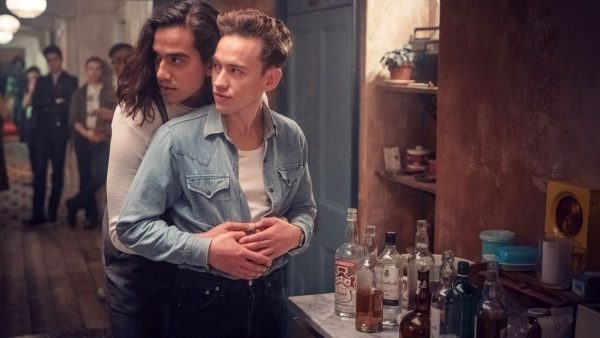Television Review: “It’s a Sin” — Poignant Remembrance of the AIDS Era
By Sarah Osman
Despite its inevitable darkness, It’s a Sin never loses sight of the joys of existence.

Ash (Nathaniel Curtis, left) and Ritchie (Olly Alexander) in Russell T. Davies’s It’s a Sin.
In 1999, Russell T. Davies released Queer as Folk, a revolutionary chronicle of the adventures of young gay men living in Manchester, UK. Twenty years later, Davies’s series is still beloved. His new show, HBO Max’s It’s a Sin, comes off as a companion piece. The major difference is the time period: Queer as Folk was set in 1999 while It’s a Sin takes place in 1981.
Now airing on HBO Max, the premise of It’s a Sin is rather similar to Queer as Folk: three adolescent gay men all move to London. They hang out at the same pub and become friends and eventually roommates. There’s Ritchie (Olly Alexander), a budding actor from the Isle of Wight who has not yet come out to his family; Colin (Callum Scott Howells), a shy tailor from Wales who is learning to embrace his sexuality; and Roscoe (Omari Douglas), who tells his conservative Nigerian family to piss off (while in full drag) and runs off to the city. Along with Ritchie’s friend and fellow actor Jill (Lydia West), the group moves into a flat together and becomes an improvised family.
The AIDS pandemic began as a series of wild rumors and hearsay, and that is how the news arrives in It’s a Sin. Colin’s coworker and mentor Henry (Neil Patrick Harris once again proving his impressive acting range) lives with his boyfriend, Pablo. The pair take Colin under their wing (there’s a truly endearing dinner scene) and that makes it all the more heartbreaking when both Henry and Pablo fall ill with the same mysterious disease. Pablo is taken home to Portugal by his mother; Henry is left to wither away in the hospital. The latter’s death serves as an invaluable reminder of just how quickly AIDS destroyed communities, and how older gay men served as mentors to the young. Impending doom haunts It’s a Sin‘s protagonists. My mom often bemoaned the loss of the many gay friends she had while living in New Orleans in the ’80s; she cursed how the government did nothing to stop the pandemic. The country’s years of indifference to AIDS ensured that countless stories of pain, suffering, and resilience were not heard; those with AIDS were confronted with hatred, hostility — and silence. In a way, It’s a Sin serves as a memorial to these lost voices, though the series is not sufficient to mourn all the souls lost to a senseless, if premeditated, carelessness.
It’s a Sin couldn’t help but be poignant, but it is particularly biting in our era of COVID. The plague in our current pandemic was politicized and so was AIDS. And there was the identical tragic outcome: additional suffering for the sake of the gain of a few powerful people. Throughout the last year some COVID deniers have yelled at those wearing masks, sometimes even attacking them. Armed protests have greeted lockdowns. The various characters in It’s a Sin react in similar ways to AIDS. Ritchie, who is the most hedonistic, denies AIDS existence: he is too clever to believe such rubbish. On the other hand, Jill chooses to arm herself with as much knowledge as she can about AIDS and she takes care of those who have succumbed to it. It is ironic, and frustrating, to watch Jill meticulously clean and then don kitchen gloves before visiting a sick friend’s house — we know that is not how AIDS is spread. Still, her hunch is not too far off from how some have mistakenly reacted to COVID, such as cleaning every inch of their grocery bags when science tells us that it is not necessary. Even now, plague taps deep into our unconscious fears, our dependence on superstition.
Still, despite its inevitable darkness, It’s a Sin never loses sight of the joys of existence. The series does a solid job of mixing frivolity with the situation’s severity. In this regard, It’s a Sin resembles 2018’s Pose, another skillful exploration of the emotional highs and lows of the AIDS crisis. Both series take the same wise stance: when life turns bleak, there is still always something to laugh about. It’s a Sin also suggests that laughter can be an inspiring way to remember those who were lost.
Sarah Mina Osman is a writer living in Los Angeles. She has written for Young Hollywood and High Voltage Magazine. She will be featured in the upcoming anthology Fury: Women’s Lived Experiences under the Trump Era.
